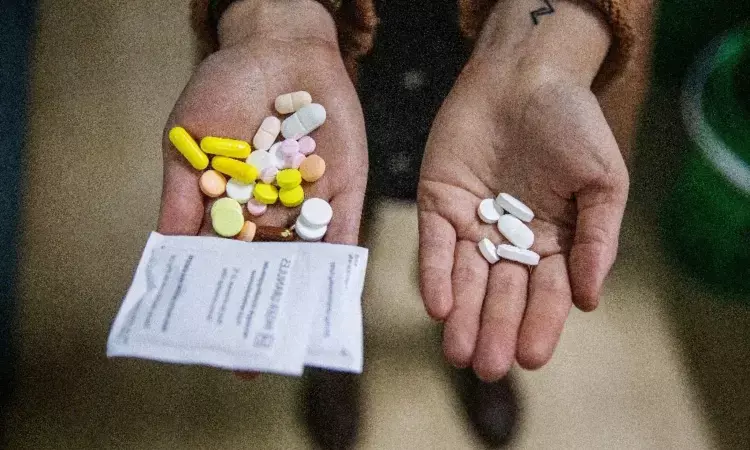- Home
- Medical news & Guidelines
- Anesthesiology
- Cardiology and CTVS
- Critical Care
- Dentistry
- Dermatology
- Diabetes and Endocrinology
- ENT
- Gastroenterology
- Medicine
- Nephrology
- Neurology
- Obstretics-Gynaecology
- Oncology
- Ophthalmology
- Orthopaedics
- Pediatrics-Neonatology
- Psychiatry
- Pulmonology
- Radiology
- Surgery
- Urology
- Laboratory Medicine
- Diet
- Nursing
- Paramedical
- Physiotherapy
- Health news
- Fact Check
- Bone Health Fact Check
- Brain Health Fact Check
- Cancer Related Fact Check
- Child Care Fact Check
- Dental and oral health fact check
- Diabetes and metabolic health fact check
- Diet and Nutrition Fact Check
- Eye and ENT Care Fact Check
- Fitness fact check
- Gut health fact check
- Heart health fact check
- Kidney health fact check
- Medical education fact check
- Men's health fact check
- Respiratory fact check
- Skin and hair care fact check
- Vaccine and Immunization fact check
- Women's health fact check
- AYUSH
- State News
- Andaman and Nicobar Islands
- Andhra Pradesh
- Arunachal Pradesh
- Assam
- Bihar
- Chandigarh
- Chattisgarh
- Dadra and Nagar Haveli
- Daman and Diu
- Delhi
- Goa
- Gujarat
- Haryana
- Himachal Pradesh
- Jammu & Kashmir
- Jharkhand
- Karnataka
- Kerala
- Ladakh
- Lakshadweep
- Madhya Pradesh
- Maharashtra
- Manipur
- Meghalaya
- Mizoram
- Nagaland
- Odisha
- Puducherry
- Punjab
- Rajasthan
- Sikkim
- Tamil Nadu
- Telangana
- Tripura
- Uttar Pradesh
- Uttrakhand
- West Bengal
- Medical Education
- Industry
New Guidelines Recommend Shorter, All-Oral Regimens for Drug-Susceptible and Drug-Resistant Tuberculosis

USA: An international panel of experts has released guidelines advocating for shorter, all-oral drug regimens for both drug-susceptible (DS) and drug-resistant (DR) tuberculosis (TB) in adults and children.
The clinical practice guideline developed by the American Thoracic Society (ATS), Centers for Disease Control and Prevention (CDC), European Respiratory Society (ERS), and Infectious Diseases Society of America (IDSA) has updated recommendations for treating both drug-susceptible and drug-resistant tuberculosis. The guideline emphasizes a shift toward all-oral, shorter treatment regimens, which significantly improve patient adherence, convenience, and overall treatment outcomes.
The guidelines, published online in the American Journal of Respiratory and Critical Care Medicine, are derived from recent clinical trial data and adapted from the World Health Organization's (WHO) 2022 consolidated guidelines on tuberculosis. The joint panel comprised 25 experts in pulmonary medicine, infectious diseases, pediatrics, epidemiology, and public health, alongside a patient advocate.
Key Recommendations Include:
Treatment of isoniazid- and rifampin-susceptible TB in adults: A 4-month regimen of isoniazid, rifapentine, moxifloxacin, and pyrazinamide are conditionally recommended over the standard 6-month regimen for individuals aged 12 years or older with drug-susceptible pulmonary tuberculosis.
Treatment of nonsevere TB in children: For children and adolescents aged 3 months to 16 years with nonsevere, drug-susceptible TB, the 4-month regimen of 2HRZ(E)/2HR is recommended instead of the 6-month 2HRZ(E)/4HR regimen, provided there is no suspicion of multidrug-resistant or rifampin-resistant TB.
Treatment of rifampin-resistant, fluoroquinolone-resistant TB: For adolescents aged 14 and older and adults with rifampin-resistant pulmonary TB who are resistant or intolerant to fluoroquinolones, the 6-month BPaL regimen (bedaquiline, pretomanid, linezolid) is recommended over longer regimens exceeding 15 months, provided the patient has no prior exposure to bedaquiline and linezolid or has been exposed for less than one month.
Treatment of rifampin-resistant, fluoroquinolone-susceptible TB: For adolescents aged 14 and older and adults with rifampin-resistant, fluoroquinolone-susceptible pulmonary TB, the 6-month BPaLM regimen (bedaquiline, pretomanid, linezolid, moxifloxacin) is preferred over 15-month or longer regimens in patients with multidrug-resistant or rifampin-resistant
Reduced pill burden and fewer side effects
While further studies on the cost-effectiveness, acceptability, and feasibility of the shorter regimens are needed, the panel expects these updated guidelines to be positively received by clinicians and patients.
"The new treatment options offer shorter durations, all-oral regimens, and a reduced pill burden, making them more patient-friendly. For drug-sensitive TB, patients can benefit from regimens that cut treatment time by a third, while the all-oral 6-month regimens for drug-resistant TB are safer and more effective than older treatments, potentially reducing morbidity and mortality," the panel wrote.
Reference: https://doi.org/10.1164/rccm.202410-2096ST
Dr Kamal Kant Kohli-MBBS, DTCD- a chest specialist with more than 30 years of practice and a flair for writing clinical articles, Dr Kamal Kant Kohli joined Medical Dialogues as a Chief Editor of Medical News. Besides writing articles, as an editor, he proofreads and verifies all the medical content published on Medical Dialogues including those coming from journals, studies,medical conferences,guidelines etc. Email: drkohli@medicaldialogues.in. Contact no. 011-43720751


